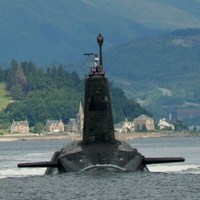As the British armed forces rebuild after more than a decade of sustained military operations in Afghanistan and Iraq, the strategic components of the U.S.-U.K. “special relationship” have come under intense scrutiny. At the politico-strategic level, while London remains committed to working alongside the U.S., there is deep concern that Washington has become a less than reliable partner. Indeed, there is a widespread view among British policymakers that in spite of the casualties taken by the British in support of a failed U.S. policy, Washington now prefers Germany to Britain as its “special” European partner. Were it not for the political and economic turmoil in the eurozone, U.S.-U.K. relations might be in crisis.
At the military-strategic level, London believes that the “rebalancing” of U.S. forces toward the Asia-Pacific has profound implications for Britain’s defense strategy and defense posture. Since the 2010 Strategic Defense and Security Review (SDSR), London has moved to re-energize its commitment to NATO just at the time when Washington appears to be downgrading its commitment to the alliance. With the post-Afghanistan transition dominating the preparations for SDSR 2015, the military-strategic question for the British concerns the balance to be struck between expeditionary and stabilization operations, given uncertainty about both American and European defense-strategic intentions.
Britain’s building of two supercarriers, HMS Queen Elizabeth and HMS Prince of Wales, suggests a shift away from the land-centric operations dominant this past decade toward a more maritime-amphibious focus. However, this shift should not be misunderstood as a desire to go with the U.S. into the Pacific. Rather, Britain is seeking to position itself as a coalition leader of Europeans and others should the Americans be otherwise engaged in the event of another Libya-style operation. The recent recommitment to the U.K.-Netherlands Amphibious Force is very much part of that strategy, as is the 2010 Franco-British Defense and Security Treaty.

